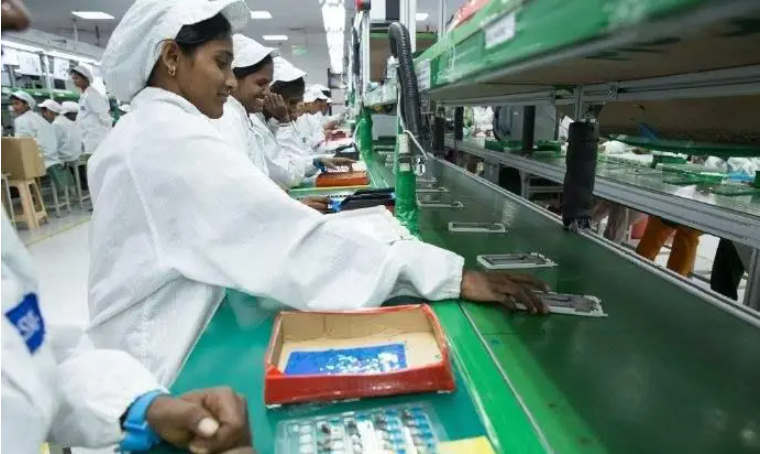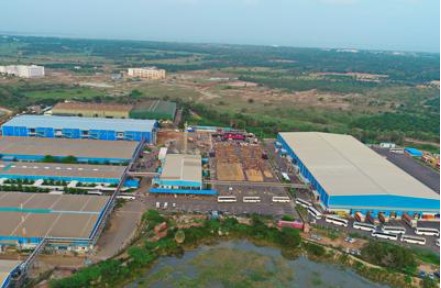Foxconn expanding iPhone production capacity in India is blocked: recall mainland workers, equipment is detained!
2025-01-13 14:59:51 702
January 12 news, according to “Rest of the world” reports, according to five people familiar with Foxconn India business, Hon Hai's Foxconn will stop sending mainland Chinese workers and equipment to the Apple iPhone factory in India, has been stationed in India, mainland Chinese workers were also recalled, and the original shipment of special equipment for India was detained in China. Manufacturing equipment is detained in China.
Foxconn's Expansion of iPhone Production Capacity in India Blocked: Mainland Chinese Workers Recalled, Equipment Detained!

Figure. 1 Foxconn's Tamil Nadu factory in India.
According to the report, the development of this incident may disrupt the operation of Foxconn's iPhone factories in Tamil Nadu and Karnataka in southern India, which in turn will affect the production progress of the next generation of iPhones, and these two factories are an important part of Apple's transfer of part of the iPhone production capacity from mainland China.
In this regard, Apple and Foxconn has not yet commented on this, the Chinese and Indian government departments have not yet responded.
In recent years, in order to reduce dependence on mainland China, Apple has been actively transferring part of the iPhone production capacity to India.
Information shows that Foxconn, Apple's largest foundry for iPhones, has been producing several older models of iPhones at its Tamil Nadu factory in India since 2019.
Then during the epidemic, affected by the epidemic control policy, Apple began to accelerate the process, and even the latest iPhone flagships began to be produced in India.Beginning in 2023, for the first time, Apple produced the iPhone 15 and iPhone 15 Plus in India immediately after the fall new product launch, and in 2024, it was almost synchronized with mainland China to produce the high-level The production of iPhone 16 Pro series in 2024 is almost synchronized with the production of high-end iPhone 16 Pro series in mainland China, showing that Apple is increasingly valuing the Indian market and local supply chain.
According to Morgan Stanley's estimates, Apple's revenue from India in 2023 will grow 42% annually to $8.7 billion, and iPhone shipments in India will grow 39% to 9.2 million units, making it the company's fifth-largest cell phone market.
Hon Hai's chairman, Liu Yangwei, recently revealed that its Foxconn has invested more than $1.4 billion in India by 2024, and its operations in the country have exceeded $10 billion. One of its factories in India's Tamil Nadu state employs around 40,000 workers and is currently producing the latest models such as the iPhone 16 Pro and iPhone 15.
Foxconn's expansion of iPhone production capacity in India blocked: mainland workers recalled, equipment seized!

Figure. 2 Foxconn's Tamil Nadu factory in India.
The latest Bloomberg report also shows that Apple assembled $14 billion worth of iPhones in India in the fiscal year ending March 2024 through factories operated by Foxconn, PEGATRON, and India's Tata Group, accounting for roughly 14% of total iPhone capacity.
Additional forecast data suggests that Apple plans to increase the share of iPhones made in India, from the current 14 percent to 25 percent, over the next three to four years.
But now it seems that Apple wants to achieve this goal is not easy.
While Foxconn's two iPhone foundries in India's Tamil Nadu and Karnataka states employ about 50,000 Indian workers, production and management still relies on mainland Chinese workers and a handful of expatriate staff from China and Taiwan, as well as machinery and equipment from China, according to a report by Restofworld.
However, according to people familiar with the matter, Foxconn's mainland Chinese employees who were scheduled to travel to India in recent weeks have been told to cancel their trips, even though staff members who were granted visas and air tickets have been barred from traveling, and specialized manufacturing equipment needed for Foxconn's Indian factories has been detained in China.
People familiar with the matter said that at present, because the relevant equipment and manpower can not be shipped to India, and India lacks the technology to produce these equipment, the move will hinder Apple and Foxconn in India to develop the next generation of iPhone goals, which also highlights Apple in the United States and China at a time of heightened tensions, trying to shift production capacity from mainland China is facing new difficulties.
To minimize the potential impact of the shutdown on production, Foxconn is considering sending additional employees from China and Taiwan to replace mainland Chinese workers, whose travel to India has not been affected.
Foxconn has stepped up production and export of semi-finished iPhones from its Chinese factories to ensure that the final assembly plant in India can continue to produce enough iPhones, the sources noted.
Kyle Chan, a postdoctoral research associate at Princeton University who studies industrial policy in China and India, told Rest of the World that Beijing may be wary of manufacturing shifts, especially to India, which is seen as a geopolitical rival to China and an alternative to democracy. alternative.
“Perhaps China, like many countries, was surprised that Apple was able to move some of its iPhone production to India so quickly,” he said, adding that Beijing could also use the restrictions to show its influence over U.S. companies.
India and China have long had a strained relationship due to border disputes and other factors. The two Asian powers are locked in simultaneous economic rivalry, with a growing number of European and American companies in India seeing India as an alternative to China as they reorganize their supply chains locally, said Harsh V. Pant, a professor and vice president of research and foreign policy at Observer Research Foundation in New Delhi, India.
But India's trade deficit with China persists as it boosts its manufacturing capacity through Prime Minister Narendra Modi's “Make in India” program. Harsh Pant told Rest of the World that the Chinese mainland will take steps to prevent India from challenging its position as a global manufacturing powerhouse and to ensure its dominance.




